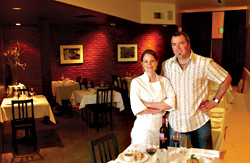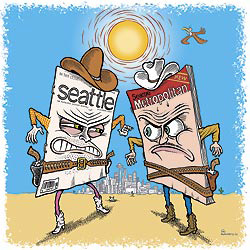Labor Days
Edited by David Gates (Random House, $13.95)
In one underappreciated way, television is miles ahead of literary fiction. Since the birth of modern TV in the ’50s, sitcoms have portrayed the workplace, and working-class Americans, with more consistency and variety than any other genre in any medium. Clearly, literature has some catching up to do, and novelist David Gates’ goal in editing this anthology is to showcase prose fiction’s ability to ground its characters in a believable working environment, in which the mundane details of the 9-to-5 shift somehow—alchemically, perhaps—become interesting.
I’ll say this: If I’m going to read stories about work while on the bus to work, or home from work, or during any other part of my leisure time, well, they’d better be damn good stories. In his brief, chummy introduction to Labor Days, Gates points out that most Americans—most people, one would assume—don’t enjoy their jobs all that much, even though they “spend half [their] waking lives in a workplace of some sort.” While this concept often makes for excellent satire, even those lucky bastards who enjoy their jobs can find something to fascinate them in Days.
George Saunders’ “Pastoralia,” a comic take on life as a corporate cog, certainly supports Gates’ contention that we spend an obscene amount of time doing things we despise. “Pastoralia” finds two unfortunate souls working at a live-action history museum that requires them to act like Neanderthals in a carefully controlled display environment. In true satiric style, the exaggeration involved in this premise—the workers’ only food source is the daily goat they’re given to roast on a spit, for example—evokes the insulation (and isolation) of office life at least as hauntingly as Lynn Tillman’s realistic portrait of a proofreading room at a nondescript company, from her novel No Lease on Life.
Perhaps the most affecting inclusion, however, is Raymond Carver’s story “Fat,” told from the perspective of a sensitive young waitress at an unremarkable restaurant. In this simple tale of an obese man who dines at the narrator’s workplace, our deeper reason for working eight hours a day—every weekday, rain or shine—finally emerges: We do it to be around other people. The waitress in “Fat” comes away from her encounter strangely moved, and with an inexplicable sensation: “My life is going to change. I feel it.” Which makes sense: After all, every day on the job changes you; without the workplace you love to loathe, the laugh track of your life would fall silent, and those recurring characters with whom you gossip, fool around, and/or snort coke in the company bathroom would be mere figments of your lonely imagination. NEAL SCHINDLER








